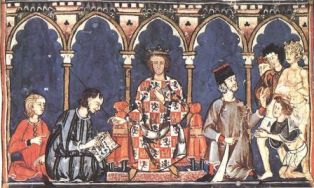
Outside Apamea
Syria
War Council of Basil II
February 25th, Dawn
The Emperor slept in the same size tent as his soldiers, ate the same rations as them, and all together shared much of the hardships they faced. A few of the many reasons that the army were firmly devoted to their supreme commander. The utter loyalty of the army naturally made him unchallenged in other aspects of ruling. The Ecumenical Patriarch did not challenge Basil in regards to ecclesiastical affairs and the nobility either supported him or grudgingly towed the Imperial line.
However, for this war council a larger, hexagonal, tent had been erected. A short table with numerous wooden pieces had been laid out to denote positions. The map depicting the geography of Northern Syria in details. Carefully copied by Imperial Cartographers in Constantinople from sources in the Imperial Library. The Emperor stood in a plain soldiers uniform, his golden scale armor and Imperial crown denoting him as superior but otherwise he was devoid of all the usual Imperial trappings.
To his left stood Damian Dalassenos, commander of the Syrian Thematic troops. Next to him was John Trytokses commanding the Cilician troops dispatched from Tarsus. There was also several other officers of the Imperial Army surrounding the table. Nikephorus Illatatzes who was a Topoteteres and commanded the Hikanatoi; Theodor Vallinikos, Topoteteres of the Athanatoi detachment with his subordinate the Komes Konstantinos Pharaon. Directly across from the Emperor stood Domestikos and acting as the Emperor's second in command for this campaign, Vetranis Laskaris. The list went on as three more officers entered the tent and filed in to the left of Vetranis and completing the ring.
"Aleppo is well fortified by Al-Dawla and his predecessor. The Antioch Gate will be facing us when we arrive from the West." said Damian. Pharaon spoke up in reply, "How many men does the Emir command? Surely he would have sent word to the Caliph?"
"The Caliph is weeks away. We must take the city before he arrives." said Trytokses. Dalassenos and Laskaris nodded in agreement. Basil however remained silent and just began to stroke his pure white beard. His words coming off flat but at the mere sound of his voice silence filled the tent.
"The fortifications would not be so different from when we occupied the city more than twenty years ago. The weakest part will be the stretch of wall between the right flanking tower of the Antioch Gate and its next tower one hundred yards away. The wall is thin there and could be collapsed under sustained artillery fire."
"But my Basileus, what if we need to turn around and hold the city should the Caliph march upon us?" said Vetranis. Basil looked down at the map, "Then the answer is simple. We take the city with the walls still standing. Our siege train will have the equipment and materials needed for siege towers."
....
February 25th, Mid-Morning
Basil watched as his army wound into the distance along the old Roman road. Once used by the Legions of the Caesars in ages past in their wars with the Parthians and Sassanids. Before the coming of the Muslims and Arabs. The road had been well used by not exactly well maintained after the retreat of the Romans from these lands before Basil's predecessors began their reconquest of rightful Imperial land. As such his army could not march six abreast like the Roman roads were designed for. Forcing them to march four abreast on foot or three mounted horsemen across. The long baggage train spanned three miles behind the rear of the Army while light horsemen patrolled the flanks of the long column of soldiery marching East. Just over twenty-two thousand men marched under the banners of Christ, the Virgin Mary, and the Cross.
February 27th, 1100 Hours
Aleppo
The morning prayer had been called and the bustling of the Bazaars filled the air. At least until a rider bearing the livery of the Emirate came thundering through the Antioch Gate. The men on the battlements shouting at the rider, "What is it!" ,"What did you see!" , "Are the Romans coming!"
The rider looked up and replied, "Look West! The infidel has come!" Before the rider sped off to the Citadel to warn the Emir. The men on the battlements looked back West to rising dust clouds. Slowly black dots came into view, seen through the rising dust as they trampled through farmers fields of low growing crops, gradually morphing into the visage of mounted riders clad in polished armor, swords and maces at their hips, lances grasped in one armored hand while the other grasped reins to their mighty steeds. Some bore bows on their backs and quivers attached to their saddles. Two thousand cavalry rushed into the environs of the city and began spreading into companies. Squadron by squadron splitting into a crescent then a gradually closing circle. They were containing the city, trapping farmers and the like outside of it, and keeping the garrison from sortieing en masse.
Citadel of Aleppo
The Emir met with the rider in his throne room. Taking the news in stride Aziz soon strode from the Citadel decked in ornate polished silver armor bearing elaborate tessellating patterns. A blue plume flowed from the top of his silver helm. Lu'Hakir moved in next to the Emir, "The Roman cavalry have surrounded the city. Will we ride out and meet them?"
"No. The Bulgar-Slayer will not be far behind them. We will be caught between his cavalry and the incoming infantry. They'd rout us before the day is out."
The two men made the rest of the way in silence as they wound through the city and to the Antioch Gate. Down the hill and through the winding streets till they began mounting the wall from narrow stone stairs. Taking places above the gate with the banners of the star and crescent above them. The Emir had mobilized 4,000 men to gather in the city. While also raising any man able to bear arms for the siege. Bringing in an additional 3,300 to assist in the defense of the city.
February 27th, 1500 hours
The Byzantine Infantry indeed was not far behind and begun setting up camp, defenses, and battle lines around the city immediately. They dug latrines, laid caltrops, raised tents, and drove in stakes and fence work. All the while teams of Imperial artillery men bean putting together the massive siege engines of the Army brought from Constantinople, Antioch, and Tarsus. A lone rider however approached the gates.
"Basileus Basil Bulgaroktanus request that the Emir, Aziz al-Dawla, come forth and surrender the city. Blood not be shed save for those responsible for the breaching the peace. The murder of innocents; and, desecration of Christian Holy places!"
The Emir simply frowned while Lu'Hakir glanced at his master. "Your reply?" The Emir took a bow and single arrow. Letting it loose at the messenger. The arrow thudded a few feet from the rider. The rider looking back, reining his horse around, and galloping away. The Emir put down the bow and stalked off back to the Citadel to leave Lu'Hakir to lead the defense of the city.
February 28th, 0800 Hours
Basil walked through the ranks of Imperial soldiers as he came upon the siege engines. The army had assembled thirty trebuchet, seventeen ballistae, a dozen catapults, several mangonels, and three siege towers still under construction to the army's rear.
Basil nodded, pat soldiers on the shoulder, and traded small talk with the men as he made his way through the companies of men in straight, organized, lines. The artillery men tended their machines, cranking back the robes, and loading ordinance into them with practiced skill. Eventually Basil wound his way to the front of the army. The siege engines formed a slight semi-circle around the city's Western Walls. Valentris Laskaris came up next to him, "Ready to let loose My Lord."
Basil raised his right hand and the artillery men tensed. The hand dropped and the sky bled fire. Thirty flaming rocks struck the walls, towers, and crashed into the city behind. Causing entire families to scream and flee in terror. Trebuchet ordinance crashed through stone walls of houses, burst through the ceilings of shops, and caught fire to the bazaars cloth verandas. Numerous fires rose through the as the trebuchet artillery kept firing as fast as the crews were able to keep pace. Giving a steady stream of heavy stones assaulting the city. Emirate soldiers ran to fires to put them out. Scurrying along the walls as heavy stones struck them, glanced off towers, or struck just right to burst through the top ramparts. Lu'Hakir shouted orders and commands. A ghulam threw him down as a trebuchet munition smacked onto the top of the wall, heading a man dead on and reducing him to red spray, taking a second man as it brushed his leg. Shattering the bones inside. His screams fill the air as the barrages continued.
Then the catapults and mangonels released their munition. Red jars shatter among the tops of the walls, towers, and into the city behind. The interior filled with a smelly solution that burst into flames as the jars shattered. Anywhere the viscous solution touched was set alight. Caltraps wrapped in tow, like massive flaming grenades, struck the defenders and civilians alike. A jar crashed onto the walls, forming a puddle of flame with caltrops wrapped in tow sitting in the flames. A ghulam rushed up with water. Lu'Hakir watched the man and realized it too late. "No!" The man tossed the water on the flames. An explosion, blinding light, and hot pain as a sharp caltrop struck Lu'Hakir's arm. His arm only saved from the mail he wore. Looking up the man grasped his face as the flames had set alight his clothes. His skin melting from the intense heat, bone shown on his face as his flesh boiled away in his hands. His screams of torment like the worst sounds of hell.
Soldiers panicked, screamed, and looked frantically around for leadership. Horrified men yelling , "demons!", "Djinn!", while the more veteran spoke in whispered terror of what it actually was, "Roman fire..." Or to the Western chroniclers. Greek Fire. "Sand! we need sand!" shouted Lu'Hakir as that was one of the few things on hand to stuff the cursed fire of the Romans.
The barrage continued the entire day and into the night. The Byzantines artillery working in shifts while sentries paced the perimeter of the Roman lines. Entire districts of Aleppo burned while the walls and towers became increasingly pockmarked from the continuous fire of the siege engines. All the while the Siege towers rose higher as crews worked around the clock bolting and assembling the mighty war machines.
February 28th, 0900 Hours
Antioch Gate
Lu'Hakir awoke, his arm ached and he knew it would have an apple sized bruise there, his helmet removed and sitting next to him. The Roman artillery had not ceased throughout the night. Denying many of the defenders sleep as when one fire was snuffed. Another would be lit by the crashing of an artillery round. But now it was quiet. The assault was forthcoming. Lu'Hakir looked at the armored soldiers around him. The mail and lamellar clad men were tired. Bags under their eyes. A horn sounded from the Roman lines causing Lu'Hakir to look West. The siege towers moved forward slowly. Ranks of Roman infantry kept as they moved forward company by company. Banners and pennants flapping in the breeze.
"Archers!" said Lu'Hakir. The archers on the wall knocked arrows and pulled back their composite bows. "LOOSE!" A hail of arrows shot from the top of the walls and towers onto the incoming Roman ranks.
Below many Roman soldiers looked up and their officers took up a shout almost in reply, "Foulkon!" The Byzantine infantry raised and locked their shields together. In a time when Latin was the dominate language of the Empire this formation was known as the Testudo. Arrows thunked into the shields of the Romans as the siege towers and attendant infantry moved forward. Meanwhile the Muslim archers continued to rain down arrows upon the advancing enemy.
Muslim soldiers gathered where the siege towers would drop their bridges. Awaiting the enemy. Shields raised as Roman archers and crossbowmen traded fire at increasingly close ranges. Lu'Hakir walked along the wall shouting encouragement to the men. Stepping over corpses and trying not to loose his footing on the blood slick parts of the walls were men had perished. Leaving their life force to puddle about them. As the towers got close the men locked their shields in waiting. Swords and scimitars drawn and ready. But then the towers stopped, their draw bridges didn't drop, instead two wooden flaps above opened up to reveal two bronze nozzles. Lu'Hakir back peddled and tripped over a corpse, "Get back!" A few men turned to their commander in confusion. Fire streamed from the nozzles like a dragon's breath. Wreathing the men in flames as they yelled, men stared in horror, and the burning human torches scrambled about. Rolling in futility along the walls, falling off the back to a quicker death, or slowly turning into motionless lumps of burning man and metal.
Then the drawbridges dropped with iron spikes catching on the crenelations. Catching the stone crenelations and providing a strong anchor. Imperial soldiers stormed across and dropped into the Muslim defenders. Archers let loose at point blank ranges while the Romans continued in a never ending stream. Urged by their officers to move up the towers and across to battle. Swords clanged, maces thudded, and the cries of the dying filled the air. Buzzards cawed in the heavens.
Lu'Hakir flung himself into the fray yelling prayers to Allah.
February 28th, 1300 Hours
Basil rode through the opened gate way of the Antioch Gate. The Western walls had been taken by mid-day, the Antioch Gates opened, and columns of Romans troops streamed into the city. Swiftly overwhelming defenders fleeing the walls to the Citadel. The Citadel itself provided a fortress within a fortress for the Byzantines to take however. But Basil looked about the carnage as he rode under the gate and looked about the damaged streets and buildings. Dismounted his horse, a soldier grasping the reins, the Emperor walked up the stone stairs to the top of the gate and along the wall a short distance. There he spotted a man being dragged by a pair of Syriac troops. They dumped his body in front of the Emperor.
"This one fought bravely. Prisoners say he is Lu'Hakir, the commander of the defense in the Emir's stead." said an approaching officer. A Kentarchos, who commands roughly a platoon of 40 men.
Basil looked down at the man. His turban had evidently been knocked off during the fighting and a wound on his scalp indicates he'd taken a blow to the head. The Emperor knelt down on his haunches. For having seen over sixty years he still possessed a strong body. "Do you speak Greek?" He could see the man lived. Lu'Hakir slowly looked up, his head feeling like it was on fire, looking to see the face of the Emperor before him.
"I know enough Basileus." replied Lu'Hakir
"My men say you fought bravely. I believe them. Otherwise we would have taken the walls sooner." The Emperor raised is left hand. His mail clad fist was given a leather sheepskin full of watered down wine. Basil offered it to the man. Lu'Hakir raised it to his lips and stopped for a moment. It was watered down to the point where it would actually hydrate him. But he could still make out a tint of alcohol. Basil let out a chuckle as he rose back to standing, "I am sure your God will forgive a single drink after your courage today. Put him with the rest of the prisoners and dress his wounds."
Basil turned and walked away. Walking back down the stairs to be met by a company of Varangians and a squad of Heteireia guards. The same soldier led his white horse back to him. Allowing the Emperor to remount and resume his way deeper into the city. Eventually coming in front of the Citadel were about fifty yards away he saw his soldiers using a battering ram on the Citadel gates. Muslim archers threw rocks and let loose with arrows on the Romans who had their shields raised in defense to shield the battering ram wielding soldiers. Byzantine archers and crossbow men in turn shot back up at the defenders.
"We expect to breach the gate house tomorrow." the voice of Damian Dalassenos drifted over the sounds of violence. The Emperor looked at the defenses. There were very few archers on the battlements. The enemy probably did not have many men left. After all the initial count listed nearly five thousand slain Muslims on the walls and streets of the city with hundreds of others prisoner.
"Gate house doors can be remade swiftly. Brink up fire." said Basil with a wry smile. A few minutes later the word reached down the chain of command and the battering ram was withdrawn. Instead men brought forth red painted jars and piled them up near the gate. While a group of soldiers brought up a bronze looking contraption with bellows on one side and a tube out the other side. A horn sounded and the men guarding the pots with their shields practically sprinted away while a trio of soldiers, one bearing the end nozzle with worked a small brass latch, and two carrying large shields to shelter them from arrow fire. The man bearing the nozzle crouched with his compatriots shielding him. The man opened the latch and a pair of men worked the bellows. Out shot a stream of fire and once it reached the jars there was a white hot flash. The sound of thunder and the splintering of wood as if struck by a giant wielding a hammer. When the spraying fire subsided and the flames stabilized to smoldering low fires. The Romans charged forwards. Surging through the gate house and up the causeway into the outer courtyard. The men on the walls turned and fled. While in the courtyard the remainder of the Emir's Ghulams and loyal soldiers met the Romans head on. Devolving into a chaotic melee that lasted approximately ten minutes until they were overcome.
By the end of the day the Emir, Aziz al-Dawla's head was mounted on a spear before the Antioch Gate.
March 1st
Aleppo
A lone rider, a Muslim, rode through the Antioch gate. His banner that he carried made him a messenger of the Caliph of Cairo. As such the Romans did not waylay him and let him go up to the Citadel. Where he was brought before Basil. Who now sat on the throne of the Emir. He had seized the Emir's treasury, 101,501 Dinars and another 200 pounds of gold and silver objects. Half of which was distributed to the troops while the rest would be taken to Constantinople.
"A messenger from the Caliph." said a Varangian as he led the man into the presence of the Basileus. The man prostrated himself before Basil and rose to hold out a small scroll. A Varangian took it and gave it to Basil who opened it. He knew Arabic well enough though he would not call himself fluent.
"Tell your master that the Emir has paid for his crimes and the thirty years of treaties broken. As for the city. This place has proven quite troublesome for both the Caliph and I. It will be Roman with a Roman governor from now on. But, due inform him that the peace between him and I is still intact."
The messenger bowed and left.
Grona
The reply to Heinrich II was s expected. As such servants throughout the Palace-Fortress readied meals, wines, beers, stables, rooms for guests, and stoked fires. Awaiting the arrival of the Dukes and his entourage. The Holy Roman Emperor, wore golden and red robes of silk. Bearing again, black eagle imagery, and the crown of Charlemagne upon his brow. Waiting in his throne room for his guest to arrive.





















